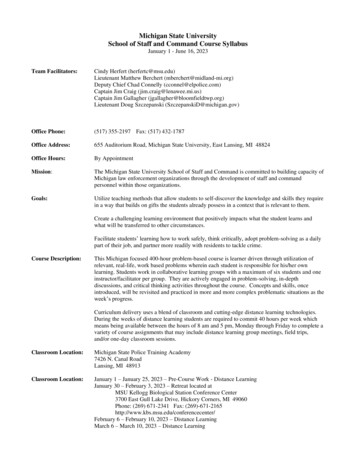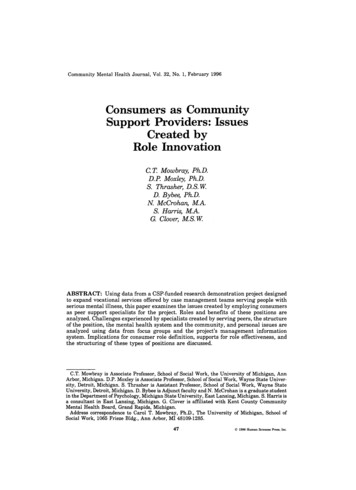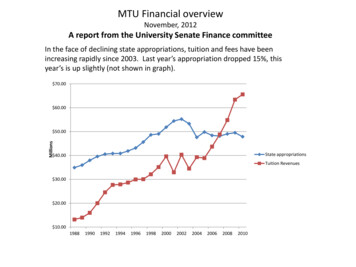
Transcription
Michigan State UniversitySchool of Staff and Command Course SyllabusJanuary 1 - June 16, 2023Team Facilitators:Cindy Herfert (herfertc@msu.edu)Lieutenant Matthew Berchert (mberchert@midland-mi.org)Deputy Chief Chad Connelly (cconnel@elpolice.com)Captain Jim Craig (jim.craig@lenawee.mi.us)Captain Jim Gallagher (jgallagher@bloomfieldtwp.org)Lieutenant Doug Szczepanski (SzczepanskiD@michigan.gov)Office Phone:(517) 355-2197 Fax: (517) 432-1787Office Address:655 Auditorium Road, Michigan State University, East Lansing, MI 48824Office Hours:By AppointmentMission:The Michigan State University School of Staff and Command is committed to building capacity ofMichigan law enforcement organizations through the development of staff and commandpersonnel within those organizations.Goals:Utilize teaching methods that allow students to self-discover the knowledge and skills they requirein a way that builds on gifts the students already possess in a context that is relevant to them.Create a challenging learning environment that positively impacts what the student learns andwhat will be transferred to other circumstances.Facilitate students’ learning how to work safely, think critically, adopt problem-solving as a dailypart of their job, and partner more readily with residents to tackle crime.Course Description:This Michigan focused 400-hour problem-based course is learner driven through utilization ofrelevant, real-life, work based problems wherein each student is responsible for his/her ownlearning. Students work in collaborative learning groups with a maximum of six students and oneinstructor/facilitator per group. They are actively engaged in problem-solving, in-depthdiscussions, and critical thinking activities throughout the course. Concepts and skills, onceintroduced, will be revisited and practiced in more and more complex problematic situations as theweek’s progress.Curriculum delivery uses a blend of classroom and cutting-edge distance learning technologies.During the weeks of distance learning students are required to commit 40 hours per week whichmeans being available between the hours of 8 am and 5 pm, Monday through Friday to complete avariety of course assignments that may include distance learning group meetings, field trips,and/or one-day classroom sessions.Classroom Location:Michigan State Police Training Academy7426 N. Canal RoadLansing, MI 48913Classroom Location:January 1 – January 25, 2023 – Pre-Course Work - Distance LearningJanuary 30 – February 3, 2023 – Retreat located atMSU Kellogg Biological Station Conference Center3700 East Gull Lake Drive, Hickory Corners, MI 49060Phone: (269) 671-2341 Fax: ter/February 6 – February 10, 2023 – Distance LearningMarch 6 – March 10, 2023 – Distance Learning
March 13 – March 17, 2023 – Classroom LearningApril 10 – April 14, 2023 – Distance LearningApril 17 – April 21, 2023 – Classroom LearningMay 8 – May 12, 2023 – Distance LearningMay 15 – May 19, 2023 – Classroom LearningJune 5 – June 9, 2023 – Distance LearningJune 12 – June 16, 2023 – Classroom LearningClassroom Hours:Classroom sessions begin on Monday at 10:00 am and end on Friday at 3:00 pm. Otherwise,classes begin at 8:30 am and end at 4:30 pm with lunch provided.Participants are required to commit 40 hours of course work during the weeks of distance learning.The hours are 8:30am – 4:30 pm, unless otherwise agreed upon by the facilitators – much of thedistance learning work will be team work with all members of the team expected to participate.Text:Police PBL Blueprint for the 21st Century (Gerard Cleveland and Gregory Saville, COPS 2007).This is provided at no additional cost.The Freedom Writer’s Diary – the movie. Learners are required to view the video. (Learners mayalso read the book by the same name but familiarity with the video and its characters is required.)It’s Your Ship: Management Techniques from the Best Damn Ship in the Navy, by MichaelAbrashoff (Warner Books. Inc.)TechnologyRequirements:Participants must have access to a laptop (LAN connectivity is required and wireless LANconnectivity is highly recommended). The participants will need Internet access for the pre-coursework. The laptop will be used during the first week of class and participants should have nonrestrictive access to Google applications.Participants will also need a microphone and webcam by Tuesday, January 31, 2023.Recommended software includes Adobe Acrobat Reader (11.0.18) and Microsoft Office 2010 (orhigher) including Excel, Word and PowerPoint.To ensure the best possible experience with the Desire2Learn (D2L) course management softwarego to the following link to find the technical requirements for the necessary operating systems(OS), other necessary installed software and browser recommendations puter-requirement/Upon acceptance to the School of Staff and Command you will be given an MSU username(NetID) and password that will give you access to MSU’s D2L system as well as other MSUdistance learning resources.Final Project:The final paper is a 20-page maximum written mini-strategic plan or plan of action (withobjectives, timelines, assigned responsibility for completion, outputs and performance measures)for meeting one organizational goal (i.e., a state or condition your agency seeks to achieve)identified by the learner. The organizational goal must address a historical problem in your agencyand relate to furthering your agency’s mission.Corrections managers: the final paper is a 20-page maximum written Staffing Analysis (withobjectives, timelines, concepts and methodology, outputs and performance measures) for meetingorganizational goals as it relates to staffing and budgeting.A fifteen-minute oral presentation summarizing the plan of action for meeting that goal is alsorequired.Grading:If the Pre-Course work is not completed by the Wednesday before the first day of class, the learnerwill be dropped from the course and will have to re-apply for admittance at a future school.
This course is PASS/FAIL with evaluation rubrics used to evaluate the learner’s level ofachievement re: the identified behavior-based learning objectives. Thirteen rubrics will be utilizedwith 100 points per rubric. To continue beyond the third week of class, learners must have earneda minimum of 320 (80%) of the possible 400 points. To successfully complete the course learnersmust have earned a minimum of 1,040 (80%) of the possible 1,300 points.Upon successful completion of the 400-hour course, those who enrolled with Michigan StateUniversity prior to taking the course for either 3 or 6 academic credits will have earned a 3.0 gradeat either the graduate or undergraduate level. Additional course work may be required as per theoff-campus course instructor to raise the grade point beyond the 3.0.Course Schedule:January 1 – 25, 2023 - Pre-Course Work. Prior to attending the first day of class students arerequired to complete an eight-hour self-paced distance learning course of instruction. This precourse work insures that all students arrive for classroom instruction with a minimum baselineunderstanding of his/her responsibility for and accountability to learning. Introduction to Bloom’s Taxonomy and Critical Thinking Skills Introduction to evaluation rubrics Introduction to Emotional Intelligence An analysis of the Problem Based Learning process Completion of an on-line DiSC Personal Profile survey Completion of an on-line Emotional Intelligence surveyJanuary 30 – February 3, 2023 – Attendance is mandatory from 10 a.m. Monday morningthrough 3pm Friday afternoon at the MSU Kellogg Biological Station Conference Center. Mealsand lodging are provided. Lodging is single room within a doubles suite that shares one bath. Engage in reflective learning via blogs, personal goal setting and one-on-onemeetings with team facilitators throughout the course. Examine participant’s behavioral style based on feedback from DiSC PersonalityProfile survey, Examine different behavioral styles and the environment that is required formaximum productivity and harmony in the work organization, Discuss how law enforcement is part of a larger criminal justice system and howchanges to one part impacts the other parts, Create a blog, Practice using various features of Microsoft Word, Create a PowerPoint presentation, Examine participant’s learning style and the learning styles of others, Assess participant’s emotional intelligence and how those skills impact participant’sproductivity and harmony in the workplace as well as personally, Identify the participant’s conflict behavior style using the Thomas-Kilmann conflictmode instrument, Create a successful, well-functioning learning team, Discuss the pros and cons of evaluation rubrics – as they will be used throughout thiscourse, Discuss shifting paradigms within the field of law enforcement, Examine via case study the pitfalls of and how to avoid “Group Think”, Practice using the problem-based learning 5-step process – this will continuethroughout the course, Practice incorporating multiple learning styles into oral presentations, Practice oral presentation skills, Identify and examine current and emerging technologies - this will continuethroughout the course, Practice peer teaching – this will continue throughout the course, Create professional and personal growth goals for this course and track progressthroughout the course.
February 6 – February 10, 2023 – Distance learning. Practice using PBL, Examine Calls for Service, Access and use distance learning technologies and resources of the MSU DistanceLearning Library, Examine various strategies for marketing a police agency’s value to its community, Practice use of on-line meeting technology, Zoom Examine participant’s multiple intelligences. Understanding social media utilization for the police organizationMarch 6 – March 10, 2023 – Distance Learning Explore organizational vision, mission, and core values, Compare what an agency says it is doing with what it is actually doing, Develop organizational goals and objectives, Trend analysis: personnel and resources research and data collection, Practice written presentation skill building.March 13 – 17, 2023 – Classroom Learning Practice oral presentation skill building, Tour the Michigan Intelligence Operations Center at MSP Hq. Assess current strategies for recruiting, training and retaining the millennialemployee, Recognize the “evidence” based distinction in best practices models found in variouspolice related fields and its importance to requesting federal funds (grants, etc.), Examine various evidence-based data driven approaches to crime and traffic safety, Practice identifying a match between employee needs and the appropriate leadershipstyle via case scenario (Situational Leadership), Design and lead a book dialogue on the reading It’s Your Ship: ManagementTechniques from the Best Damn Ship in the Navy, Conduct a “crucial conversation”, Practice conducting meetings, creating an agenda, keeping time and recordingbusiness conducted.April 10 – 14, 2023 – Distance Learning Write a federal grant requesting funds for use by participant’s agency, includingbudget, budget narrative, work-plan, SF 424, and assurances, Practice writing clearly and concisely.April 17 – 21, 2023 – Classroom Learning Practice oral presentation skill building, Compare and contrast traditional budget process with zero-based budgeting process, Discuss government financing and the municipal budget process, Examine excerpts from Gettysburg and discuss re: EI and leadership, Write a basic incident command plan that identifies roles and responsibilities, formanaging a given multi-jurisdictional, high profile case, Draft a communication plan around a given multi-jurisdictional, high profile case, Practice participation in a press conference.May 8 – 12, 2023 – Distance Learning Develop a zero-based budget with justification for requested expenditures. Practice written presentation skills. Practice PBL process. Corrections Manager examine staffing shifts and positions.May 15 – 19, 2023 – Classroom Learning Oral presentation skill building, Review sexual harassment laws and individual and organizational response,
Evaluate participant agency’s officer suicide prevention policies and practices,Using case scenarios, evaluate various FOI requests for police records orinformation,Examine employee discipline and the rights of employees in the internalinvestigatory process,Examine police resource allocation at participant’s agency,Examine recent high profile use of force incidents from across the country and therole of community partnership to mitigate backlash,Write a rule, policy and procedure,Analyze and lead group discussion on five leadership practices common tosuccessful leaders (Kouzes and Posner),Examine the concept of procedural justice.June 5 – 9, 2023 – Distance Learning Identify a historical problem that relates to the learner’s police agency mission, Develop an organization goal to address the identified learner agency’s historicalproblem, with objectives, timelines and assignment of responsibility, Create a comprehensive written mini-strategic plan or plan of action on how theidentified problem will be resolved. Corrections – Conduct a staffing analysis of the jailo Develop a plan that will explain the concepts/methodology of analysiso Create a comprehensive written plan or plan of action for addressing the jailsetting, assignment plans, and evaluation of the prepared plan.June 12 – 16, 2023 – Classroom Learning Practice oral presentation skills on audiences with varying learning styles, Examine the concept of Strategic Planning, Discuss the Michigan Sheriffs Association Line of Duty Death SMMART teams, Outline a strategy for managing change within a law enforcement agency, Design and lead group discussion around the video Freedom Writers, Discuss the Future of the Criminal Justice Field via panel presentation by membersof Michigan’s law enforcement leadership and related disciplines, Graduation.Class Attendance: Participants are paid employees while attending class and completing distance learning course work.Rules of attendance and conduct are the same in the classroom as during a regular work assignment. Attendance informationwill be maintained. Absences and tardiness will be reported to the learner’s agency at the time they occur.Conduct and Dress: Only proper business casual (slacks and shirts with collars) attire shall be worn by participants of theSchool of Staff and Command program during classroom sessions. Blue jeans, tank tops, shorts, t-shirts, and jogging suitswill not be worn in the classroom. Firearms – Be guided by your departmental policy.The MSU School of Staff and Command is a single course topic consisting of 400 hours.
University prior to taking the course for either 3 or 6 academic credits will have earned a 3.0 grade at either the graduate or undergraduate level. Additional course work may be required as per the off-campus course instructor to raise the grade point beyond the 3.0. Course Schedule: January 1 - 25, 2023 - Pre-Course Work. Prior to attending .











